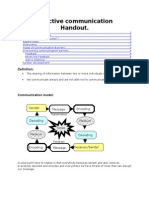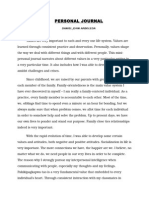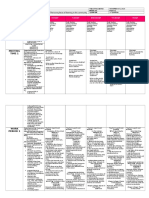Ideal Team Player Handout
Ideal Team Player Handout
Uploaded by
anton_swainCopyright:
Available Formats
Ideal Team Player Handout
Ideal Team Player Handout
Uploaded by
anton_swainOriginal Title
Copyright
Available Formats
Share this document
Did you find this document useful?
Is this content inappropriate?
Copyright:
Available Formats
Ideal Team Player Handout
Ideal Team Player Handout
Uploaded by
anton_swainCopyright:
Available Formats
THE IDEAL TEAM PLAYER
Humble
Ideal team players are humble. They lack excessive ego or concerns about status. Humble people are quick to point out
the contributions of others and slow to seek attention for their own. They share credit, emphasize team over self and define
success collectively rather than individually.
Hungry
Ideal team players are hungry. They are always looking for more. More things to do. More to learn. More responsibility to
take on. Hungry people almost never have to be pushed by a manager to work harder because they are self-motivated and
diligent. They are constantly thinking about the next step and the next opportunity.
Smart
Ideal team players are smart. They have common sense about people. Smart people tend to know what is happening in a
group situation and how to deal with others in the most effective way. They have good judgment and intuition around the
subtleties of group dynamics and the impact of their words and actions.
Humble, Hungry and Smart—The Three Virtues Combined
What makes humble, hungry and smart powerful and unique is not the individual attributes
themselves, but rather the required combination of all three. If even one is missing in a team member,
teamwork becomes significantly more difficult, and sometimes not possible.
The Source for Organizational Health
www.tablegroup.com
© 2016 The Ideal Team Player by Patrick Lencioni
SELF-ASSESSMENT
Instructions: Take this assessment to evaluate yourself relative to the three
virtues of an ideal team player. Respond as honestly as possible, as this will
allow you to most accurately identify any areas of development that you may have.
Use the scale below to indicate how each statement applies to how you think
your teammates may see you and your actions on the team. Choose the rating
response number that best applies to each statement and record it in the box to
the right of the statement. Then total your scores for each of the three virtues.
Rating Scale: 3 = Usually 2 = Sometimes 1 = Rarely
Name _________________________________________________________ Score
1. I compliment or praise them without hesitation.
HUMBLE 2. I easily admit to my mistakes.
MY TEAMMATES
3. I am willing to take on lower-level work for the good of the team.
WOULD SAY:
4. I gladly share credit for team accomplishments.
5. I readily acknowledge my weaknesses.
6. I offer and accept apologies graciously.
TOTAL HUMILITY SCORE
7. I do more than what is required in my own job.
HUNGRY
8. I have passion for the “mission” of the team.
MY TEAMMATES
WOULD SAY: 9. I feel a sense of personal responsibility for the overall success of the team.
10. I am willing to contribute to and think about work outside of office hours.
11. I am willing to take on tedious or challenging tasks whenever necessary.
12. I look for opportunities to contribute outside of my area of responsibility.
TOTAL HUNGER SCORE
13. I generally understand what others are feeling during meetings and conversations.
SMART
14. I show empathy to others on the team.
MY TEAMMATES
WOULD SAY: 15. I demonstrate an interest in the lives of my teammates.
16. I am an attentive listener.
17. I am aware of how my words and actions impact others on the team.
18. I adjust my behavior and style to fit the nature of a conversation or relationship.
TOTAL SMART SCORE
SCORING
Remember, the purpose of this tool is to help you explore and assess how you embody the three virtues of an ideal team player. The standards
for “ideal” are high. An ideal team player will have few of these statements answered with anything lower than a ‘3’ (usually) response.
A total score of 18 or 17 (in any virtue) is an indication that the virtue is a potential strength.
A total score of 16 to 14 (in any virtue) is an indication that you most likely have some work to do around that virtue to become an ideal
team player.
A total score of 13 or lower (in any virtue) is an indication that you need improvement around that virtue to become an ideal team player.
Finally, keep in mind that while this tool is quantitative, the real value will be found in the qualitative, developmental conversations among team-
members and their managers. Don’t focus on the numbers, but rather the concepts and the individual statements where you may have scored low.
The Source for Organizational Health www.tablegroup.com © The Table Group, Inc. All rights reserved.
You might also like
- Team Building ActivitiesDocument7 pagesTeam Building ActivitiesInsane100% (2)
- Brief Summary of The Ideal Team Player PDFDocument8 pagesBrief Summary of The Ideal Team Player PDFDaba DiengNo ratings yet
- Psychiatric Clinical Skills Goldbloom AdrianDocument377 pagesPsychiatric Clinical Skills Goldbloom Adrianubuntumic100% (2)
- Ideal Team Player Book Club: Leadership & Coaching Cop - June 10, 2021Document10 pagesIdeal Team Player Book Club: Leadership & Coaching Cop - June 10, 2021William O OkolotuNo ratings yet
- Parker Team Player For Grad StudentsDocument23 pagesParker Team Player For Grad StudentsRavnish Wesley100% (2)
- Team Strengths GridDocument11 pagesTeam Strengths GridsneakerheadNo ratings yet
- Ecfc LNL WorkbookDocument10 pagesEcfc LNL WorkbookAlex SolisNo ratings yet
- Discover Your Team Player StyleDocument7 pagesDiscover Your Team Player StyleTache74No ratings yet
- Self Assessment Exercises 2021Document14 pagesSelf Assessment Exercises 2021Beloved1234No ratings yet
- 5 Dysfunctions of A TeamDocument5 pages5 Dysfunctions of A Teamhammad haiderNo ratings yet
- DISC Profile Category PDFDocument1 pageDISC Profile Category PDFCalvin100% (1)
- DiSC-Profile-and-Four-Types-of-Conflict PDFDocument1 pageDiSC-Profile-and-Four-Types-of-Conflict PDFعمرو عليNo ratings yet
- Dare To LeadDocument15 pagesDare To Leadsamesoul02No ratings yet
- The 7 Habits of Highly Effective PeopleDocument10 pagesThe 7 Habits of Highly Effective PeopleZaikaNo ratings yet
- Dealing With Different PersonalitiesDocument13 pagesDealing With Different PersonalitiesGilbert Gabrillo JoyosaNo ratings yet
- Generations at WorkDocument27 pagesGenerations at WorkSheena HarrienNo ratings yet
- Organizational Leadership Study NotesDocument3 pagesOrganizational Leadership Study NotesMORDENO, JOHN GABRIEL O. SCINo ratings yet
- Comfort Zone To Growth ZoneDocument14 pagesComfort Zone To Growth ZoneHasan Saud100% (1)
- Ebook Persolog Personality (En)Document18 pagesEbook Persolog Personality (En)Marina Sava100% (1)
- Core Values Worksheet 1222Document7 pagesCore Values Worksheet 1222austintx360No ratings yet
- Trust FoundationsDocument2 pagesTrust FoundationsValaki Mimi100% (1)
- Win As Much As You CanDocument6 pagesWin As Much As You CangpascualmNo ratings yet
- 01 NLD - AbovePlant - Workbook - Final - 24 JanDocument49 pages01 NLD - AbovePlant - Workbook - Final - 24 JanIulian BarbuNo ratings yet
- Creating A Shared Vision in Your GroupDocument15 pagesCreating A Shared Vision in Your Groupdaiana.issabayevaNo ratings yet
- NHSLeadership Leadership Framework Clinical Leadership Competency Framework CLCFDocument67 pagesNHSLeadership Leadership Framework Clinical Leadership Competency Framework CLCFMansyahNo ratings yet
- InsightsDocument9 pagesInsightsfnahmaniNo ratings yet
- R.A.K Colege of Nursing, New Delhi: Subject:-Educational Methods and MediaDocument12 pagesR.A.K Colege of Nursing, New Delhi: Subject:-Educational Methods and MediaIkhsan As Hamba AllohNo ratings yet
- Discovering Your Authentic Leadership HBR NotesDocument2 pagesDiscovering Your Authentic Leadership HBR NotesMichelle ZhangNo ratings yet
- Personal Leadership Evaluation: NameDocument2 pagesPersonal Leadership Evaluation: NameBert HernandezNo ratings yet
- Building and Sustaining Effective TeamsDocument28 pagesBuilding and Sustaining Effective Teamssir_arifullahNo ratings yet
- The Speed of Trust: Sunday, October 8, 2006Document9 pagesThe Speed of Trust: Sunday, October 8, 2006randall_welbornNo ratings yet
- Leadership Development Plan BillyandriDocument11 pagesLeadership Development Plan BillyandriBillie Yandri FirsaNo ratings yet
- F I R O: UndamentalDocument24 pagesF I R O: UndamentalrakeshNo ratings yet
- Free Download PDF 9780470681619 - The EQ Edge Emotional Intelligence and Your SuccessDocument25 pagesFree Download PDF 9780470681619 - The EQ Edge Emotional Intelligence and Your SuccesssipodiNo ratings yet
- Bruce Tuckmans Team Development ModelDocument3 pagesBruce Tuckmans Team Development ModelRhulli Ventitres100% (1)
- Coaching and Mentoring in LeadershipDocument21 pagesCoaching and Mentoring in LeadershipBuudha ChakrabortyNo ratings yet
- Maslow's Hierarchy How The "House of Cards" CrumblesDocument66 pagesMaslow's Hierarchy How The "House of Cards" Crumblesken jacobsenNo ratings yet
- Risb Scoring ManualDocument2 pagesRisb Scoring ManualTauseef Fatima0% (1)
- Meg Wheatley + Angela Blanchard - Leaders For The Storm, Aug 2011Document6 pagesMeg Wheatley + Angela Blanchard - Leaders For The Storm, Aug 2011David HoodNo ratings yet
- Motivation and Goal SettingDocument17 pagesMotivation and Goal SettingFelicia Cristina CotrauNo ratings yet
- Art of Focused ConversationDocument10 pagesArt of Focused ConversationCarlos AlbertoNo ratings yet
- Leadership and Management QuestionnairesDocument13 pagesLeadership and Management QuestionnairesThu Hien PhamNo ratings yet
- Weekly Rhythm RegisterDocument6 pagesWeekly Rhythm RegistersridharchebroluNo ratings yet
- MA in Happiness Studies (Digital)Document6 pagesMA in Happiness Studies (Digital)Miri SimiNo ratings yet
- The Essential Guide To Workplace AccountabilityDocument11 pagesThe Essential Guide To Workplace AccountabilityUnni NarayananNo ratings yet
- Mind MapDocument1 pageMind MapRumbling QueenNo ratings yet
- Mindtools AssessmentDocument4 pagesMindtools Assessmentapi-272993959No ratings yet
- Effective Communication HandoutDocument5 pagesEffective Communication HandoutdrakosroroNo ratings yet
- 7 Habits 1nDocument15 pages7 Habits 1nmehul kotkar100% (1)
- Leadershipforthetwenty First Century Rost EbsDocument4 pagesLeadershipforthetwenty First Century Rost EbsAnibal LoguzzoNo ratings yet
- Psychological Safety QuestionnaireDocument3 pagesPsychological Safety QuestionnaireFarrah MalaNo ratings yet
- Bite-Sized Training™: Get Creative!Document13 pagesBite-Sized Training™: Get Creative!Joulo YabutNo ratings yet
- Style Under Stress Results - VitalSmarts PDFDocument3 pagesStyle Under Stress Results - VitalSmarts PDFdurrrrNo ratings yet
- Leading High Performing Teams WorkbookDocument13 pagesLeading High Performing Teams WorkbookJyro TriviñoNo ratings yet
- Values Card SortDocument1 pageValues Card Sortapi-307132793No ratings yet
- Eighty-Eight Assignments For Development in Place 2. LombardoDocument7 pagesEighty-Eight Assignments For Development in Place 2. LombardoErik Montaño50% (2)
- FeedForward Ebook PDFDocument41 pagesFeedForward Ebook PDFFerdinand KentjanaNo ratings yet
- Conflict ManagementDocument62 pagesConflict Managementjoseph syukur peranginangin100% (1)
- Difficult Conversations: Discussion GuideDocument8 pagesDifficult Conversations: Discussion GuideHemanth GatlaNo ratings yet
- OB11 - 04in Personality and EmotionsDocument59 pagesOB11 - 04in Personality and EmotionsAjay Prakash VermaNo ratings yet
- Chapter 2 RRLDocument14 pagesChapter 2 RRLRuvy Caroro Legara DenilaNo ratings yet
- Homeroom (Decisive Person)Document6 pagesHomeroom (Decisive Person)arianeanonymous1No ratings yet
- Behavioral Interventions - 2023 - Kamana - Large Scale Evaluation of Staff Training in Programs For Adults WithDocument22 pagesBehavioral Interventions - 2023 - Kamana - Large Scale Evaluation of Staff Training in Programs For Adults WithNBNo ratings yet
- mg401 2Document269 pagesmg401 2Rana Shakoor100% (1)
- Quote Essay OutlineandSampleDocument5 pagesQuote Essay OutlineandSampleHaznetta HowellNo ratings yet
- 02 Perceived Supervisor SupportDocument9 pages02 Perceived Supervisor Supporthuy270985No ratings yet
- Eckhart Tolle and The Fallacies of Borrowed BuddhismDocument3 pagesEckhart Tolle and The Fallacies of Borrowed Buddhismst iNo ratings yet
- PSYCHOSOCIAL-Module SHSDocument18 pagesPSYCHOSOCIAL-Module SHSJuan CruzNo ratings yet
- Karnival Kokurikulum: Template of Developing A 3-Part Lesson Lesson Plan/ RancanganmengajarDocument4 pagesKarnival Kokurikulum: Template of Developing A 3-Part Lesson Lesson Plan/ Rancanganmengajarhifzul7679No ratings yet
- 4 VirtuesDocument5 pages4 VirtuesCamille MataNo ratings yet
- 1st Grade Lesson PlanDocument3 pages1st Grade Lesson Planklemay2009100% (1)
- SocialWorkerPowerPointCO-OP PresentationDocument13 pagesSocialWorkerPowerPointCO-OP PresentationAngela Blanco-RamosNo ratings yet
- Lecture 3 Dimensions of CultureDocument37 pagesLecture 3 Dimensions of CulturesamonlamNo ratings yet
- When Psychologists Become Builders: Jon Sutton Investigates Where Lego and Psychology IntersectDocument4 pagesWhen Psychologists Become Builders: Jon Sutton Investigates Where Lego and Psychology IntersectsubashgsubashNo ratings yet
- Asb Speech NMDocument2 pagesAsb Speech NMapi-503927765No ratings yet
- Key Concepts and Questions To Ask in Media LiteracyDocument39 pagesKey Concepts and Questions To Ask in Media LiteracyElijah SantosNo ratings yet
- Group Assessment FinalDocument2 pagesGroup Assessment FinalVo HaianhNo ratings yet
- Facilitating of Learning ReportDocument33 pagesFacilitating of Learning ReportMargie VueltaNo ratings yet
- Developmental MilestonesDocument8 pagesDevelopmental Milestones3aces100% (1)
- Personal Journal: Daniel John ArboledaDocument3 pagesPersonal Journal: Daniel John ArboledadanieljohnarboledaNo ratings yet
- Rules For Sociological MethodDocument8 pagesRules For Sociological MethodIvneet VohraNo ratings yet
- Depression PDFDocument2 pagesDepression PDFMonique MavronicolasNo ratings yet
- Health 1st LessonDocument3 pagesHealth 1st Lessonjonathanfetalcorin0502No ratings yet
- Principles of Handwriting Development: Children's Occupational TherapyDocument9 pagesPrinciples of Handwriting Development: Children's Occupational TherapyDalan DanNo ratings yet
- 3RD Quarter Week 22 KindergartenDocument7 pages3RD Quarter Week 22 Kindergartenjosh gormeNo ratings yet
- Arika Sari's Math ExperienceDocument2 pagesArika Sari's Math ExperienceEnimo IndonesiaNo ratings yet
- Elil5983 Culminating Project Bertina BookerDocument20 pagesElil5983 Culminating Project Bertina Bookerapi-357399877No ratings yet
- Absorbing Society Self-Discrepancy and Internalized Shame: 'S Influence: Body ImageDocument5 pagesAbsorbing Society Self-Discrepancy and Internalized Shame: 'S Influence: Body ImageJeral PerezNo ratings yet
- Reflection of Assessment Strategies 2017Document5 pagesReflection of Assessment Strategies 2017api-263506781No ratings yet

























































































